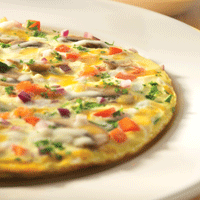If you’ve ever had a night out in Halifax, there’s a good chance you’ve noshed a messy, sweet and savoury donair. The classic Haligonian dish is saucy, intensely spiced and unmistakeably meaty — spit-roasted beef is shaved and seared, heaped on a pita and topped with raw onions, tomatoes and a creamy garlic dressing. Devouring one is practically an East Coast gastronomic rite of passage. So, what’s a donair-deprived vegetarian to do? That’s easy: head over to Halifax’s The Wooden Monkey for the herbivore’s version of the quintessential late-night snack.
“Our city is known for this dish,” says Lil MacPherson, co-owner of the veggie-friendly restaurant. “Last year we created a vegan donair so more people can enjoy it.” The Wooden Monkey’s rendition ($16) is made with seitan — a gluten-based product nicknamed “wheat-meat” — marinated in tamari, garlic and ginger, topped with red onion, tomato and sweet coconut sauce and tucked inside a porridge pita. Seitan has a texture similar to the traditional meatloaf-style beef and slices the same way. “It looks just like donair meat and has the same flavours,” MacPherson says. “Our customers love it.”
When MacPherson and co-owner, Christine Bower, opened their organic-and-local-focused restaurant nine years ago, they attracted folks looking for healthy options, including many vegetarians. In December 2012, along with business partner Matthew Gass, they opened a second location. “‘Vegetarian’ and ‘vegan’ aren’t strange words anymore,” MacPherson says. “We keep adding vegan dishes to our menu, because they sell. People are educated about the health benefits of eating vegetarian — even meat-lovers.” Carnivorous guests often top the legendary Lentil Burger ($13) with bacon and, once, a tofu-eschewing diner gobbled up a Vegan Chocolate Pie ($8.50) when he was duped by his date. (The signature dessert is made with non-dairy chocolate and creamy organic silken tofu.)
Both locations are about to launch a brunch menu complete with traditional eggs benny as well as scrambled tofu. “It’s important to come up with new dishes,” MacPherson says. “Our customers are always looking for fresh options, and we have to make sure our staff knows what items are vegan and what substitutions are available.” The sustainable-food activist is passionate about what she brings to her community and The Wooden Monkey menu is sought after by locals and international A-listers. MacPherson has catered to celebs such as Paul McCartney, Mick Jagger, K.D. Lang and vegan-lifestyle champ Alicia Silverstone. “People realize that vegetarian eating is good for the body and the environment. It’s become quite normal,” she says. “This is no granola operation.”
MacPherson is one of many in the industry taking veggie cuisine seriously. Gone (well, almost gone) is the stereotype of vegetarians as tree-huggers subsisting on brown rice, broccoli and tofu. A national revival of Meatless Monday — originally a war effort to help people cope with food-supply challenges — is inspiring Canadians to get creative with vegetables, and it helps that most people have at least one vegetarian friend, co-worker or family member.
According to NPD Group data, vegetarian entrées are ordered in less than one per cent of visits, however, the number of vegetarian entrées increased by more than 40 per cent from 2007 to 2012. Even though it only represents a small piece of the pie, the trend toward meatless meals is well noted.
“You have to look at vegetarian cuisine from a business perspective,” says Doug McNish, Toronto-based vegan chef, menu consultant and author of Eat Raw, Eat Well: 400 Raw, Vegan & Gluten-Free Recipes. “This is a revenue stream, and if you can’t accommodate vegetarians you are losing money.” The Red Seal Chef recently created vegan menus for Toronto’s tony Windsor Arms Hotel and Gravenhurst, Ont.-based Taboo Resort Golf and Spa. McNish guides restaurateurs away from the spaghetti-hold-the-meatballs approach in favour of creating thoughtful, satisfying meals. A few inspiring selections from his book include a light, summery Lemon Cucumber and Dill Soup, a hearty Kale Waldorf Salad and a decadent (and raw!) pecan pie. “Always remember the protein with main dishes,” he says. “That’s what makes you feel nourished and satiated.” (Think chickpeas, black beans, tofu and lentils.) McNish also considers umami — a Japanese term meaning “pleasant savoury taste” — a critical element in making toothsome dishes. “Umami is what makes something moreish and often comes from meat,” he says. “Nutritional yeast, aged miso and other fermented foods can add the same depth of flavour.”
Tempeh, whole fermented soybean, is a protein-rich, umami-boosting ingredient. At Toronto-based Live Organic Food Bar, the Pulled-Burdock Burrito ($14) is made with barbecue-seasoned burdock root and tempeh, kimchi, guacamole, chipotle aioli and cashew sour cream. “Our burritos and our burgers are very popular,” says Sarah MacDonald, head chef at Live. “Ingredients like burdock and tempeh take on the seasoning flavours for a taste that’s nutty, savoury and deep. These are familiar, comforting dishes, even for people who aren’t necessarily vegetarians.” These days, a lot of Live’s customers are indeed omnivores. It’s a big shift from when the pioneer veggie haunt, which specializes in raw and vegan dishes, opened in 2002. “At first, we were very cutting edge,” says Jennifer Italiano, co-owner. “Our customers were mostly young women, yogis and people trying to combat illness. Now we serve men and women of all ages and ethnicities; families and professionals. People are much more conscientious about what they eat.”
As a testament to customers’ changing desires, chef schools are now keen for students to learn vegan techniques in Live’s kitchen, and the business itself is roaring. Italiano and her brother and co-owner Christopher Italiano are opening a second location in Toronto’s hip Liberty Village neighbourhood — a hub of creative media companies, and home to legions of condo-dwelling professionals. The new take-out-style spot will offer freshly made food, along with Live’s retail products, prepared meals and juices. Live began selling packaged products, such as kale chips and cookies, in-house three years ago. Demand led Italiano to acquire a production kitchen, and soon the offering expanded to include prepared meals and fresh-pressed juices. Today, Live’s products are sold in 50 stores in the Greater Toronto Area and a few Ottawa spots — Vancouver is next. “A lot of people are eating vegetarian now, and they want options,” Italiano says. “We want to bring that to them every way we can.”
The move to go meatless at least some of the time is pervasive and vegetarian restaurateurs certainly aren’t the only ones dishing up options. At Toronto’s Bannock Restaurant, purveyors of “Canadian comfort food,” the menu is purposefully meaty: chicken, beef, pork, duck, fish, seafood — it’s all there. But a special “meatish” menu section aims to please the veggie-craving palate with Tofurkey Scallopini ($14) a dish that includes mozzarella, roasted garlic, squash mostarda and quinoa; as well as a Vegetable Cobb ($14) served with avocado, barley, deviled egg, Thunder-Oak gouda and living sprouts. “Any cook who takes their job seriously should take pride in impressing vegetarians,” says Stephen Pynn, chef de cuisine at Bannock. “Understanding vegetarian cuisine opens your mind and gives you more options for meat dishes as well.” Pynn is happy to accommodate vegan requests with “freestyle” meals. “Our menu is meat-heavy,” he says. “If someone has a special request we simply ask about their likes and dislikes and create a dish for them. It’s good to have fun with it.”
Meat-mindedness needn’t be a barrier for any restaurateur hoping to captivate vegetarian guests. At Vancouver-based White Spot, a long-standing chain known for its burgers and fries, the vegetarian menu is a priority. In May, the company will launch eight new menu items, half of which are vegetarian: Tandoori Cauliflower Quinoa Salad; Crispy Three-Cheese Agnolotti; Arugula and Goat Cheese Flatbread; and a Curried Quinoa Bowl. “This isn’t about salad,” says Danny Markowicz, executive chef of Menu Development. “We’re making nutritious meals with complete proteins; thoughtful dishes that even non-vegetarians will love.”
The new items build on the chain’s current vegetarian offerings, such as its Veggie Sunny Start ($7.99), Mushroom Spinach and Cheese Frittata ($10.99) and Fettuccini Alfredo ($11.99). “In the development process, the challenge is to react to guest requests and provide the right options,” Markowicz says. “As far as menu real estate goes, we want to make sure the dishes sell. But, even if vegetarian dishes aren’t our bestsellers, it’s still important to fill the gap.” One of White Spot’s most popular meat-free meals is, aptly, its veggie burger ($12.49). The iconic chargrilled ditty is topped with provolone, portobello mushrooms, grilled peppers and zucchini, onions, lettuce and lemon-basil aioli, served on a multi-grain bun. “We want our vegetarian dishes to taste just as good as the rest of menu,” he says.
No doubt Markowicz and other chefs across the country are making meatless meals more delicious and inclusive. Whether it’s classic comfort food in Vancouver or a traditional ethnic dish in Halifax, vegetarians can practically have it all.




















